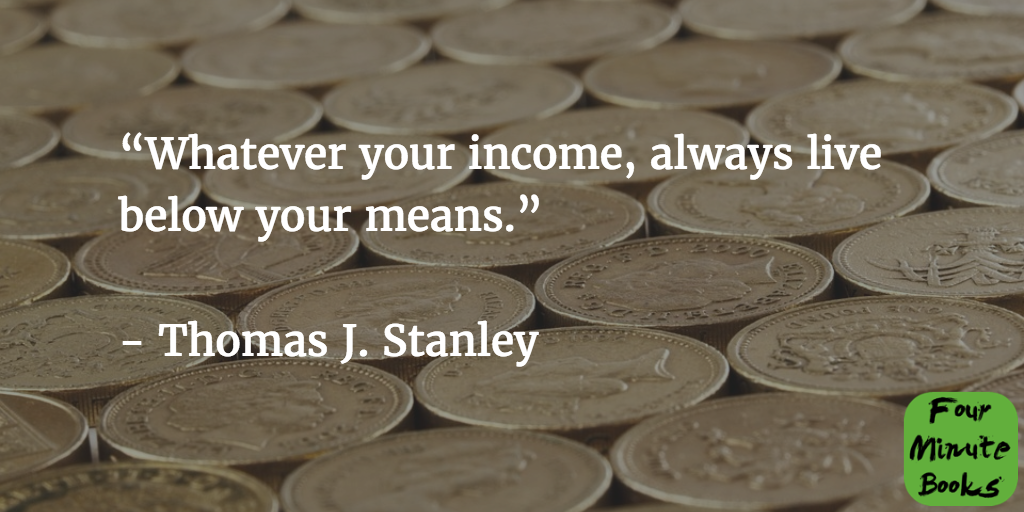
Their findings, that millionaires are disproportionately clustered in middle-class and blue-collar neighborhoods and not in more affluent or white-collar communities, came as a surprise to the authors who anticipated the contrary. The authors compare the behaviour of those they call "UAWs" (Under Accumulators of Wealth) and those who are "PAWs" (Prodigious Accumulators of Wealth). The book is a compilation of research done by the two authors in the profiles of American millionaires. The Millionaire Next Door: The Surprising Secrets of America's Wealthy ( ISBN 0-6) is a 1996 book by Thomas J. ( Learn how and when to remove this template message) ( October 2020) ( Learn how and when to remove this template message) Please help rewrite this article from a descriptive, neutral point of view, and remove advice or instruction.
#The millionaire next door quotes manual#
I’m interested to hear how you support and encourage creativity, entrepreneurship, and independence in your children.This article is written like a manual or guidebook. They’re kids, those fires may burn out, sometimes quickly, but that’s really just an opening for a new opportunity to take their place.

It’s time to find what lights them on fire, and stoke those passions into white hot flame. If I’m going to provide my kids a foundation and stability on which their future success grows, I’m going to have to be a facilitator and mental supporter, but not a crutch, or a long term monetary provider. The Millionaire Next Door outlines some causes for those fears, and ways to overcome them.

One thing is for sure, I don’t want to raise kids in constant fear of their economic situation. Between the two media, I have a new drive to stoke the creative fires in my children, and be supportive, but watch them grow, and fail, and eventually succeed at becoming self sufficient human beings, possibly even forming an income from something they love along the way. It makes me wonder what mine are capable of, and want to work with them to find out. It’s quite eye opening to hear what he’s been able to accomplish with the kids in his classes. Similar to the above passage from The Millionaire Next Door, the guest, Don Wettrick, discusses his innovative class and ideas around instilling and inspiring creativity and an entrepreneur mindset in our children. This episode also hit me pretty hard due to the content and what it could mean for my kids. I recently listened to Episode 87 of the Choose FI podcast, Education Through Innovation, you can check it out here. But for another they keep to their own space while I’m working from my office space, and unless there’s a meal or we’re seeking each other out, I may see them less than when they had a regular school schedule. For one thing, I’m home and they’re home all the time. It’s made it both easier and harder to keep track of the kids. Granted, the teenagers are more likely to exhibit the attitude than the younger ones, but it’s not mutually exclusive.Ĭovid 19 has definitely thrown a wrench into everyone’s behavior and schedule for the past 5 months. Instead of getting out of bed, eating a decent breakfast, showering, getting into a hobby, getting some exercise, or doing something creative, they stay in bed, hide in their room, shout about not wanting to do basic things, get aggressive in response to suggestions, and sometimes slip into depression. Sometimes though, they show independence as an attitude, without the actions needed to sustain a healthy existence.

Sometimes the kids show independence through their actions, their abilities to be self sufficient and control their own day. This has resulted in them showing some independence, but it’s not always the kind of independence that you want them to display. We don’t have all day every day to work with our children. I’ve been reading The Millionaire Next Door and while all of the information has been interesting and educational, the above quote smacked me across the cheek and shouted “wake up!” It’s easy to imagine why this quote would hit home for someone with 5 children, but that doesn’t make it any less prolific. But such shelters often produce adults who are in constant fear of tomorrow.” … People often attempt to shelter their children from the economic realities of life. Also, if one lives below one’s means, one doesn’t have to be concerned with the possibility of being forced to reduce one’s standard of living. It’s those who don’t concern themselves with other people’s money, someone else’s estate. “Who is more confident, more content, more able to deal with adversity? … It’s those who have been brought up by parents who rewarded independent thought and behavior.


 0 kommentar(er)
0 kommentar(er)
